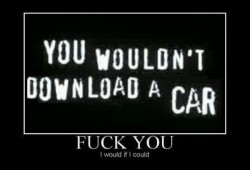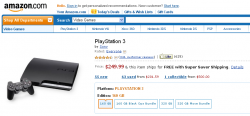Weekly News Roundup (21 August 2011)
Another relatively quiet week, but I did manage to get the NPD analysis done, for July 2011 sales, and you can view it here. Sorry for the lack of news, but I and the others that contribute news can only write about what’s there, and there wasn’t much there this week.
 But quantity isn’t everything, so let’s start with some interesting copyright news. In the MPAA’s eyes, anyone that says anything positive about online piracy is as guilty as those that download movies, steal cars and shoplift stuff.
But quantity isn’t everything, so let’s start with some interesting copyright news. In the MPAA’s eyes, anyone that says anything positive about online piracy is as guilty as those that download movies, steal cars and shoplift stuff.
And even when they’re not being positive about piracy, but merely pointing out the observation that, given the current economic conditions, piracy may become a more socially acceptable activity, the MPAA has to go into full attack mode and silence anyone, this time, it’s GigaOM’s co-editor Janko Roettgers, that dares to present the idea that a lot people who pirate movies are just ordinary citizens. For you see, the MPAA has to portray pirates as “scum”, people that are not like good, decent, voting folks, first to portray web piracy as a serious crime that needs the government and industry’s full attention, and also to ensure the politicians they’re financially lubricating are not scared into passing laws that may affect a huge percentage of their electorate.
The problem for the MPAA though is that, they’ve made similar observations in the past, including by their former boss, Dan Glickman, who correctly noted that “the current economic crisis makes this problem [piracy] much more serious than before” a couple of years ago. This time, the MPAA published an opposing piece, also on GigaOM (which came under some criticism for allowing the MPAA to do this, but it’s free speech, and it should be allowed, no matter how much we disagree with the opinion presented). But once again, we have the MPAA’s (represented by Alex Swartsel) comparing web piracy to shoplifting. But as I explained in the forum, web piracy and shoplifting cannot really be compared at all. Shoplifting means a physical loss for the store owners, as well as a potential lost sales, but not from the shoplifter, but from not being able to sell the item that is no longer there. For digital piracy, there is no such “loss” for the “store owner”, as pirates are only taking away a copy of the item that’s on sale, not the actual item itself. The only potential loss is in lost sales, but only if the pirate would have purchased the item anyway (you know, that old argument). Stores in London are complaining about their goods being looted, but I’m sure they’re not worried about the same looters not coming back to the stores and not buying their stuff because they’ve managed to get it for free.
And many of the actual lost sales from piracy are mainly because the consumer is unable to obtain the item, either in a timely manner, or in the format they want. DRM and release windows have seriously hampered the ability of the average consumer to purchase and enjoy content. And this is a point that the CEO of one of the New Zealand’s largest ISPs, TelstraClear, is pointing out. Allan Freeth goes one step further and actually attacks any laws protecting rights owners as legislation that artificially props up their business model, one that is obviously not working as well as before, if not failing completely. Freeth even cites surveys that TelstraClear conducted, asking its users why they pirate stuff, and one answer that kept on coming up was that people often had to wait days, weeks and even months to watch the same content people in the US already had access to (and then free access online via catch-up services like Hulu). This is something that I can sympathize with, living in Australia, where we’re also treated badly in terms of release Windows. Even the “fast tracked” shows are often a week or two behind the US airing schedule, and in this day and age of “instant”, that might as well be an eternity. Freeth also said that pricing as an issue, and if people can’t afford to consume your content, then don’t blame them for seeking free alternatives.
There was a development in the Viacom-v-YouTube lawsuit this week as well, as one of the major partners of Viacom in this case has withdrawn from it, after agreeing to a private settlement with YouTube owner Google. The National Music Publishers’ Association (NMPA) will no longer be part of the Viacom appeal, and Google in return, will allow music publishers (those that help song writers publish their works, as opposed to recording studios that publish recordings of these same works) to participate in their revenue sharing program, something the NMPA cites wasn’t possible before. It’s a win for Google, and it signals problems for the Viacom appeal, especially if they continue to lose partners this way.
And in DRM news, Ubisoft has backtracked and now promises not to implement “always-on DRM” in their upcoming game, Driver: San Francisco. This is only weeks after Ubisoft claimed “always-on DRM” was a huge success, despite the measure only hurting paying gamers that get their game cut off if their Internet connection decides to flake out a bit (which is an unavoidable phenomenon). I guess it wasn’t such a big success after all, or at least not enough of a success for Ubisoft to justify the lost sales from the huge public backlash. But while always-on is not longer an requirement for the latest game in the Driver series, online authentication at game launch is still very much on the cards. I’m not a huge fan of any DRM, but authenticate at launch is fine by me, as long as there’s a true offline mode (but this doesn’t seem to be the case for Driver).
Not much news in 3D/HD, so let’s skip it and move quickly onto …
![]()
… gaming. And the big story of the week was Sony announcing a price cut for the PS3. It’s only $50, but this could be a significant factor in sales over the coming months, leading up to Christmas. And this is probably the right move at the right time, because as you can see in my NPD analysis, the PS3 is now in a distant third place amongst the home based consoles in the US at least.
The price cut seems to be happening elsewhere in the world as well, where it has to be said that the PS3 isn’t doing too badly at all. Australia sees one of the bigger price cuts, $AUD 150, which is about $USD 145, but even with this huge cut, our PS3 is still more expensive than the US PS3 (so you can imagine how overpriced it used to be). Still, I’ve seen some stores starting to sell the 160GB version for just under $300, which is better, but still $60 more than the US pricing.
And that brings us to the end of yet another very short WNR. But it means I’ve allowed you to have more time to do other things, so really, you should be grateful. See you in 7.


